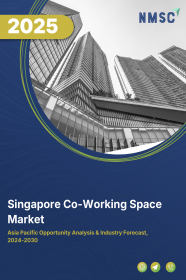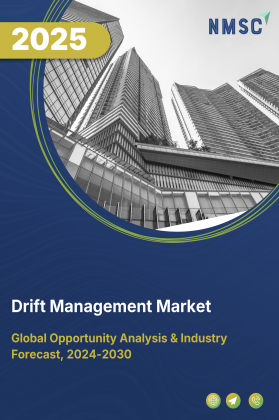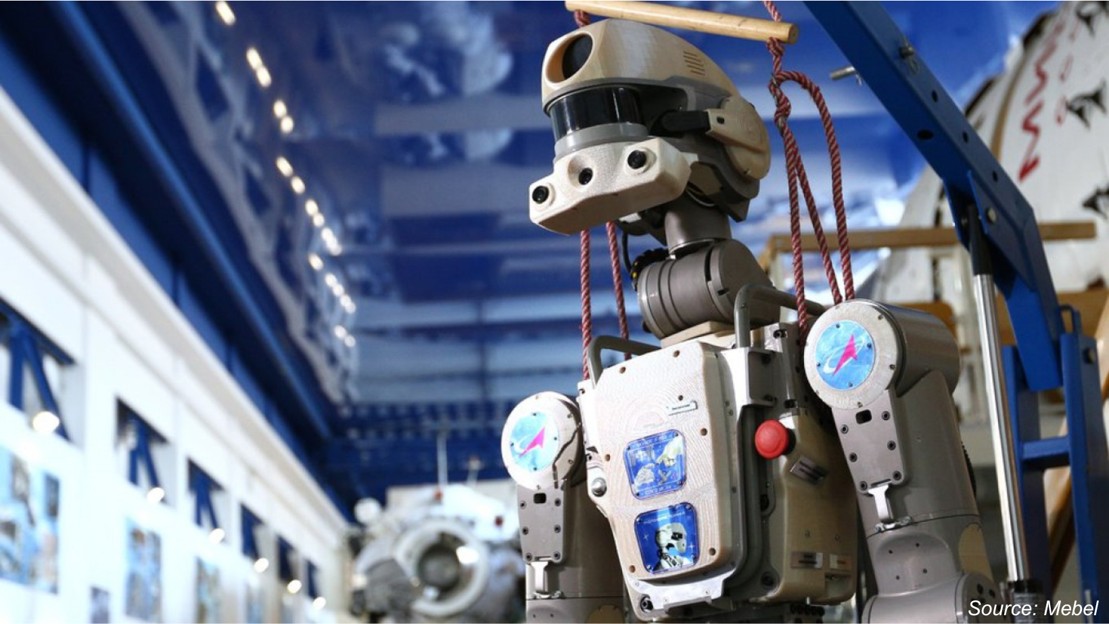
Singapore Co-Working Space Market by Space Type (Shared Open Spaces, Enclosed Private Suites, Virtual Office Solutions, Event/Meeting Facilities), by Membership Type (Hot Desks, Dedicated Desks, and Others), by Business Type (Standard Coworking, and Others), by Business Model (Direct Ownership/Operation, and Others), by End User (Freelancers/Remote Workers, and Others), by Industry Vertical (Technology & IT Services, and Others) - Opportunity Analysis and Industry Forecast, 2024–2030
Industry: ICT & Media | Publish Date: 04-Nov-2025 | No of Pages: 158 | No. of Tables: 120 | No. of Figures: 65 | Format: PDF | Report Code : IC2041
Market Overview
The Singapore Co-Working Space Market size was valued at USD 88.2 million in 2023, and is predicted to reach USD 407.8 million by 2030, at a CAGR of 24.3% from 2024 to 2030. Co-working space represents a dynamic and adaptable solution to the evolving needs of businesses. These shared work environments offer flexibility in lease terms and space requirements, appealing particularly to startups and small enterprises seeking to avoid the upfront costs associated with traditional offices.
The communal atmosphere encourages networking and collaboration among professionals from diverse fields, fostering innovation and creativity. Equipped with modern amenities and strategically located, co-working spaces provide cost-effective, scalable, and accessible alternatives for companies seeking a central presence without the constraints of long-term leases. The industry has experienced significant growth as businesses recognize the benefits of this model, embracing the collaborative opportunities and resource-sharing inherent in managed workspaces.
Enterprise Adoption of Flexible, Tech-Enable Workspaces Drives Scale
Singapore’s enterprise sector is accelerating its shift toward flexible work environments, fueled by the need for business agility, cost optimization, and digital transformation. Large corporates, including those in finance, technology, and life sciences, are increasingly opting for customizable coworking solutions over rigid long-term leases. These spaces are not only equipped with high-grade infrastructure—secure access, smart facilities management, and enterprise IT support—but also offer scalability that aligns with agile project cycles and remote workforce deployment.
By integrating into coworking ecosystems, companies benefit from plug-and-play solutions, reduced capex, and access to networking opportunities, while maintaining branding and operational control through dedicated or hybrid-use zones. This fusion of flexibility and functionality has positioned coworking as a strategic asset in corporate real estate portfolios across Singapore’s key business districts and innovation clusters.
Hybrid Work Culture Accelerates Demand for Local, Well-equipped Hubs
The rise of hybrid and remote work models post-pandemic has reshaped spatial preferences across Singapore’s workforce. Employees now prioritize decentralized work hubs that reduce commuting stress while offering productive, tech-ready environments. This has driven demand for neighborhood coworking centers that feature ergonomic design, seamless connectivity, and collaborative areas that blend professional utility with community engagement.
Operators are responding by launching satellite offices and compact coworking formats in suburban regions like Tampines, Jurong, and Woodlands. These new-generation hubs are equipped with meeting pods, wellness zones, and smart-access systems, enabling both individual contributors and decentralized teams to stay connected, productive, and engaged. The shift reflects a fundamental transformation in workplace expectations, where flexibility, location convenience, and digital compatibility take precedence over traditional office prestige.
Regulatory Gaps and Infrastructural Limitations Impede Expansion Beyond Major Cities
While the coworking boom in Singapore’s central business districts has been impressive, broader market expansion faces structural challenges. Key among these are regulatory uncertainties tied to land-use classifications and outdated licensing norms for shared commercial spaces. For coworking providers, securing clearances for operations outside core commercial zones—especially in mixed-use or residential-adjacent developments—remains cumbersome and time-consuming.
Moreover, infrastructure readiness in some emerging districts lags behind. While Singapore boasts world-class digital connectivity in its urban centers, ensuring consistent broadband speeds, data security, and facility maintenance in peripheral areas continues to be a hurdle. These constraints hinder rapid deployment and elevate operational costs for coworking operators seeking to reach underserved but high-potential markets. A harmonized, forward-looking policy framework is needed to unlock wider geographic penetration and support decentralized growth.
Emerging Digital and Academic Hubs Offer Untapped Coworking Potential
Singapore’s transformation into a digital-first economy is now radiating into innovation-focused nodes beyond the traditional city core. Areas such as One-North, Punggol Digital District, and academic zones around NUS and NTU are rapidly emerging as new frontiers for flexible workspaces. These regions host a growing concentration of tech startups, R&D centers, and university-led incubators, all of which require agile, collaborative work environments tailored to innovation workflows.
Coworking providers that align their models with these ecosystems—by offering hybrid memberships, innovation lab tie-ups, and access to venture networks—stand to gain significant early-mover advantage. Additionally, government support through initiatives like the Smart Nation strategy and Startup SG is boosting infrastructure investment, entrepreneurial activity, and digital inclusion in these non-core districts. As these hubs mature, they offer fertile ground for coworking operators to create integrated work-live-learn-play environments that go beyond office utility to deliver real community and business value.
Competitive Landscape
The Singapore co-working space industry comprises various companies, including IWG (Regus & Spaces), JustCo, WeWork, Servcorp, The Executive Centre (TEC), The Work Project, The Great Room, Compass Offices, One&Co, The Hive, Arcc Spaces, The Cocoon Space, O2Work Pte Ltd., The Workshop Industrial P.O.D.S., We Are Crane and others.
The Singapore Co-Working Space Market Key Segments
By Space Type
-
Shared Open Spaces
-
Enclosed Private Suites
-
Virtual Office Solutions
-
Event/Meeting Facilities
By Membership Type
-
Hot Desks
-
Dedicated Desks
-
Private Office Leases
-
Hybrid Flex Passes
By Business Type
-
Standard Coworking
-
Premium Managed Offices
-
Niche/Specialized Spaces
By Business Model
-
Direct Ownership/Operation
-
Franchise/Partnership
-
Real Estate Collabs
By End User
-
Freelancers/Remote Workers
-
Startups (<10 Employees)
-
SMEs (10–250 Employees)
-
Large Enterprises (>250)
By Industry Vertical
-
Technology & IT Services
-
Financial & Professional
-
Healthcare & Life Sciences
-
Manufacturing & Logistics
-
Public Sector & Education
-
Others
Key Players
-
IWG (Regus & Spaces)
-
JustCo
-
WeWork
-
Servcorp
-
The Executive Centre (TEC)
-
The Work Project
-
The Great Room
-
Compass Offices
-
One&Co
-
The Hive
-
Arcc Spaces
-
The Cocoon Space
-
O2Work Pte Ltd.
-
The Workshop Industrial P.O.D.S.
-
We Are Crane
Report Scope And Segmentation
|
Parameters |
Details |
|
Market Size in 2023 |
USD 88.2 Million |
|
Revenue Forecast in 2030 |
USD 407.8 Million |
|
Growth Rate |
CAGR of 24.3% from 2024 to 2030 |
|
Analysis Period |
2023–2030 |
|
Base Year Considered |
2023 |
|
Forecast Period |
2024–2030 |
|
Market Size Estimation |
Million (USD) |
|
Growth Factors |
|
|
Companies Profiled |
15 |
|
Market Share |
Available for 10 companies |
|
Customization Scope |
Free customization (equivalent up to 80 working hours of analysts) after purchase. Addition or alteration to country, regional, and segment scope. |
|
Pricing and Purchase Options |
Avail customized purchase options to meet your exact research needs. |

















 Speak to Our Analyst
Speak to Our Analyst

























